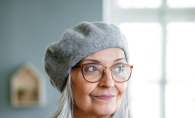After being diagnosed with breast cancer last year, Gretchen DeSutter was struggling with exhaustion caused by her chemotherapy. As a mother of four, she had plenty on her plate and couldn’t begin to think about finding the energy to work out again. Even walking around the block without someone joining her was daunting. “I’d never been down that low before in my ability to do anything,” she says. “You don’t even know where to start.”
For DeSutter and dozens of other cancer survivors, the LIVESTRONG program at the Woodbury YMCA has been that start. The free, 12-week fitness program for cancer survivors is led by instructors trained to help get participants back on their feet. While it’s a national YMCA program, Woodbury is the only location offering it in the Twin Cities. It began in 2007 after LIVESTRONG Foundation surveys showed that cancer survivors were concerned about becoming physically active and regaining strength during and after treatment.
The Woodbury YMCA has put on four sessions so far since it started offering the LIVESTRONG program in 2014. About eight to twelve people participate each session, which meets twice a week for 90 minutes and is open to members and non-members. At the beginning of the program, participants meet with Jo Jo Goulding, program manager for group exercise and active older adult activities, to discuss their goals and where they are in their treatment process along with completing assessments to gauge their abilities in areas like cardiovascular strength, balance and flexibility.
Over the course of the 12 weeks, members of the class stay active through cardio workouts, weight training and sampling YMCA classes tailored to their needs. Participants and their family members also get a free membership to all YMCAs for the duration of the program and are encouraged to work out at least one additional day each week.
Goulding says one of the biggest hurdles for the participants to get over early on is the idea of fatigue. Many of them are already exhausted from chemotherapy and are apprehensive about working out, but “what they quickly understand after they’ve started working out is that exercising actually gives you more energy,” she says. “It’s amazing even just two weeks into the program how their whole mindset changes.”
Jill Smith, who participated in the program this past spring, says the instructors were supportive in helping members of the group gradually learn new exercise techniques. “You don’t have to start out by being good at everything; they’re there to help you and teach you and make sure that you’re doing things right,” Smith says. “It was so well structured that they just took you on this continuum of progress.”
For LIVESTRONG participants, a common concern is always balance, which tends to decline as a side effect of chemotherapy. At the start of the program this past spring, DeSutter was able to balance for only about five to eight seconds on each foot. By the end of the 12 weeks, she could balance for well over a minute.
Along with the physical benefits of the program, members see improvements in their mental health. In assessments conducted before and after the program, director of healthy living Pauline Alba says they’ve seen an average of a 60 percent decrease in anxiety and a 70 percent decrease in depression among participants. “To us, that’s a huge impact on the community,” she says. The no-cost aspect helps to relieve stress, since those taking the class all have ongoing medical costs that might normally prevent them from joining a gym. “We all know that stress is only going to make you more ill, so if we can relieve as much stress as possible, the person’s going to feel better and they’re going to do better,” Goulding says.
Participants also find they leave the program with a better mindset after gaining a renewed confidence in their abilities. DeSutter found that the program helped her to regain faith that she could adapt her body and rebuild her physical fitness. “You lose faith in your own body to do what you used to be able to do, and you have to build up the confidence that in time you can regain hopefully all of that, but at least some of that back,” she says. “It’s hard to do baby steps when you want to just start doing everything like you normally used to do, but it’s great that you’re doing it as a group because you’re all in the same boat.”
Perhaps most unique to the LIVESTRONG program is the strong bond participants form with their instructors and each other. Members come from varying backgrounds and ages and are able to share their common experiences and cheer each other on for the 12 weeks—and often beyond that. “After they’ve graduated from the program, you’ll see them here at the Y and they’re just thrilled to tell you updates on how they’re doing,” Goulding says. Each participant gets a certificate and a yellow LIVESTRONG T-shirt at the end of the program, and Goulding sees many of them return to the YMCA, proudly wearing their shirts.
One of DeSutter’s favorite memories from the program was when the group was getting acclimated to the weight training. “We were all in it together to try to retrain on weights and around us were all these people who were doing massive weights and pull-ups over their head. All of us were just trying to figure out, ‘Can I do 5 pounds or 10 pounds?’” she says. “We all had a really good laugh about that.”
Looking toward the future, Goulding, Alba and participants are hopeful that the LIVESTRONG program will expand to more locations in the Twin Cities. Goulding says she’s received nothing but positive feedback from participants.
For DeSutter, the program has made “a complete difference” in her ability to bounce back from surgeries and chemotherapy. When she started the program, she didn’t feel steady on her feet and had few expectations beyond hoping to improve her balance and stamina. By the end of the program, she was able to return to work fulltime and came away with a newfound love of tai chi and yoga. “The way the program is structured, it makes it so easy for you to find the best thing that works for you, and the support system is fantastic,” she says. “It’s a really, really valuable way for you to build yourself back up.”










